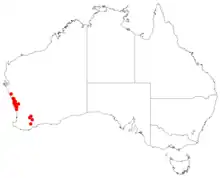Leucopogon obtectus
Leucopogon obtectus is a species of flowering plant in the heath family Ericaceae and is endemic to the south-west of Western Australia. It is a shrub that typically grows to a height of 1–2 ft (0.30–0.61 m) or more. Its leaves are rigid, broadly heart-shaped to round, and 8.5–12.5 mm (0.33–0.49 in) long and overlap each other with a small point on the tip. The flowers are arranged singly or in pairs in leaf axils and are shorter than the leaves. There are small bracts and broad bracteoles less than half as long as the sepals. The sepals are about 4 mm (0.16 in) long, the petals joined at the base to form a tube about as long as the sepals with lobes shorter than the petal tube.[2][3]
| Leucopogon obtectus | |
|---|---|
| Scientific classification | |
| Kingdom: | Plantae |
| Clade: | Tracheophytes |
| Clade: | Angiosperms |
| Clade: | Eudicots |
| Clade: | Asterids |
| Order: | Ericales |
| Family: | Ericaceae |
| Genus: | Leucopogon |
| Species: | L. obtectus |
| Binomial name | |
| Leucopogon obtectus | |
 | |
| Occurrence data from AVH | |
| Synonyms[1] | |
|
Styphelia obtecta (Benth.) F.Muell. | |
The species was first formally described in 1868 by George Bentham in Flora Australiensis from specimens collected by James Drummond between the Moore and Murchison Rivers.[2][4] The specific epithet (obtectus) means "protected", referring to the glaucous foliage.[5]
Leucopogon obtectus occurs in the Geraldton Sandplains bioregion of south-western Western Australia and is listed (as Styphelia obtecta) as "Threatened" by the Western Australian Government Department of Biodiversity, Conservation and Attractions,[3] meaning that it is in danger of extinction.[6]
References
- "Leucopogon obtectus". Australian Plant Census. Retrieved 11 March 2023.
- Bentham, George; von Mueller, Ferdinand (1868). Flora Australiensis. Vol. 4. London: Lovell Reeve & Co. p. 223. Retrieved 11 March 2023.
- "Styphelia obtecta". FloraBase. Western Australian Government Department of Biodiversity, Conservation and Attractions.
- "Leucopogon obtectus". APNI. Retrieved 11 March 2023.
- Sharr, Francis Aubi; George, Alex (2019). Western Australian Plant Names and Their Meanings (3rd ed.). Kardinya, WA: Four Gables Press. p. 263. ISBN 9780958034180.
- "Conservation codes for Western Australian Flora and Fauna" (PDF). Government of Western Australia Department of Parks and Wildlife. Retrieved 3 March 2023.